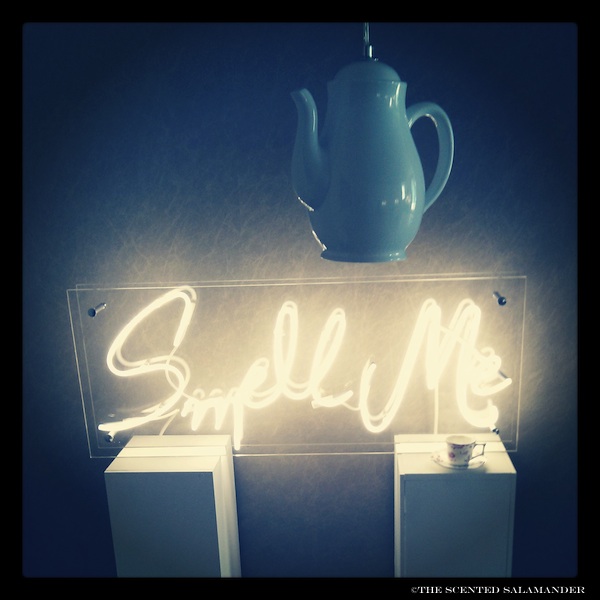Should We Curse, Love and Hate When Critiquing a Fragrance? {Scented Thoughts}

Smell-Me Installation at Mane & Fils
A comment left by reader Anton Scherbakov yesterday, and which I read today about how he felt I gave the impression I delighted in L'Acquarossa by Fendi, has made me realize more fully a phenomenon which appears in fragrance criticism, especially on the interactive internet webs.
I see it as the contemporary caveman or cavewoman paradox: while your sense of smell is the most primitive one, it also constitutes an invitation on the cultural plane today to use human language above the level of grunting and cursing or shrieking your enthrallment in a series of explosive onomatopeias and strongly-worded positions.
Marcel Proust proved it can be done with his sense of infinite and fastidious nuances. We can all work together towards a more refined language for expressing our joy or distaste about perfume. Freedom and the Internet are not about breaking glass bottles or making noise with this sense of liberty, but about making art with pieces of it.
The Internet is an almost free highway for expressing our opinions about this and that. In our case, we are talking about fragrances. Some are "great". Some "suck". Some are "meh" - the latter a term beloved by perfumistas looking for their higher-perfumery fix and happening instead on something barely more interesting than an unassuming shampoo-like scent. You may use a grading system of stars so that communicating your opinion about a fragrance looks objective and is also easy to grasp, even by weary midnight surfers...
The problem when you rely on words only is that it leaves more room for interpretation - and hence possibly misunderstandings on the part of readers of perfume reviews.
Regarding the example of L'Acquarossa, when I ask myself the question: Do I find it great? My answer is no. I find it expresses well the scent of sophistication. I do appreciate this quality. It also reminds me of older perfumes; déjà vu in perfumery is almost inescapable at some level of a perfume composition. Most of all, I was intrigued by how the fragrance tried to position itself in a fragrance world dominated by oud in this day and age.
Everybody seems to be thinking about oud. Everybody wants to put out an oud scent these days. Amidst the scrumming, here comes a perfume which seems to accomplish something more sophisticated. It acts like a rose perfume interpretation, which still thinks rose is the queen of flowers, yet at the same realizes it's time to twist noses and offer a sensation which takes you away from it, while obviously referring to it as an ideal. If Nahema by Guerlain is a big, glaring rose, Pleasures by Estée Lauder is a distanced rose stepping away from the majestic aura and proposing a fresher princess-y take on it, thanks to peony. Or take a geranium-based perfume. This would correspond to an effort at playing on the rosy spectrum of sensations. You can experience the same illusory mirroring effect with rosewood.
In this sense, I was struck by the sensation that L'Acquarossa is culturally influenced by oud while smelling not of oud but of one of its facet - raspberry - done here in a heavy, fruity manner reminiscent of the use of it in oud-y perfumes such as the groundbreaking Yves Saint Laurent M7, but also in the lesser known concoction by Nina Ricci, Deci Delà. This, to me, indicates that we are witnessing a deepening cultural shift: while oud in the beginning arrived with an air of coming from an exotic region and thus appeared to be a play on externality, it can be said to have become more and more internalized a note by mainstream Western perfumers - and many of them are French for historical reasons.
We have entered the realm of oud-nourished sensations rather than just plain reproduction of oud as a note of luxury and Orientalism. It is sculpturing our expectations rather than answering them.

Detail of a Smell-Me installation at Mane & Fils for Delicatescent
This preamble leads me to the meat of the issue which is that readers - and internet readers in particular - are often looking for obvious cues of authentic subjective appreciation in perfume criticism, or conversely, seem to hold the view that hate opinions are the hallmarks of criticism - the kind that obviously does not sell out to the brands.
Just like for human relationships and social relationships, those unconscious criteria I find too primitive personally to live by. It is fun to vent once in a while. Some perfumes are too lousy for words, just good enough for onomatopeia and gag reflexes. But then, if we look at the case of Etat Libre d'Orange Sécrétions Magnifiques, which stinks, truly, and makes you want to head for the bathroom door before it's too late, you cannot deny the fact that it remains an interesting fragrance composition. And this is the level where I operate most of the time: is this an interesting perfume, or not? Does it have interesting aspects, at least? The smell of semen is banal; once put in a bottle of Parisian perfume, it says a lot more than just: this is the smell of "nocturnal pollution," to use a quaint 18th century euphemism. Just like you can learn a lot by watching phenomenally bad movies - my example of choice for very weak movies is Liberty Belle by Pascal Kané which was so incredibly bad on so many levels it became pedagogical; you can always find something interesting to say about something fundamentally uninteresting. Sécrétions Magnifiques is well-done and disgusting, IMHO, but it is not a weak composition.
If I only said each time, it rocks my boat, or it's a real stinker, I would be mostly talking about Me, my gut reaction, and not the perfume itself. It is precisely because the sense of smell provokes gut reactions in us - and very naturally so - that we ought to challenge ourselves to refine our thoughts about those first neurological and biological responses.
Let's say I hate perfume X. I suppose I could express this opinion. But then to be honest, I would need to offer a summary of my psychoanalysis at the same time. This is about Me, rather than the perfume.
It is also important to keep in mind that as far as perfume appreciation goes, an instinctual hate reaction is more promising than indifference. It has more chances of turning into love.
I personally prefer to err on the side of objectivity. Some readers sometimes comment that they can't make out what I think of a perfume. Well, I don't think anything personal about the perfume. I see it as a world of possibilities, and in a given article isolated a few of its aspects which I thought were interesting to consider, at that point in time. I consider a critique of a perfume as something akin to a snapshot: a unique photography of a unique moment. I look also for ideas in a fragrance. I am less interested in hammering on the heads of readers what my heartfelt opinion about a perfume is. Otherwise, I would probably bore myself and you to death. I would also be limiting myself to my prejudices.
If perfume criticism can go beyond the mere scope of its material subject matter, it is to cultivate our worldviews, open them up and more particularly exercise our sense of smell and taste to further exercise our aesthetic and moral judgments, which we can then apply to broader life topics and experiences.

Still from The Night of the Hunter by Charles Laughton (1955) - Love and hate tattoos
I remember a few years ago how some reviews of Serge Lutens fragrances could elicit violence, and downright hatred. If you took a more nuanced tack, and in my case, often a poetic, day-dreaming approach, you were not doing perfume criticism the way some people expected it to look: evisceration. Or labeling. Or ego massaging and worshipping.
I'm sorry but if I want to play violent sports, I will choose hunting over perfume criticism. If I do a fan-girl review, I'll say so in advance and say that I love X so much it's like asking me to judge my 4-year old's classroom art. Don't ask me to do that, I'm just going to drool my appreciation in the next few paragraphs - and coo on top of that.
If Internet perfume criticism can combine freedom of thought - not visceral reactions, which chain you to your past - together with articulate, nuanced language, you are doing yourselves a favor as well as perfumery a favor. You are thus better able to turn perfume into an universalist cultural object of appreciation. It's not just about you, or me, or X's opinions.
Having subjective opinions about a fragrance should only be a part of what you claim to understand about a fragrance. Practising some suspension of personal judgment or aporia can yield some interesting results. A perfume does not occur in a vaccuum. It comes linked to other cultural and societal phenomena.
I remember a passage in Chandler Burr's book Perfect Scent: A Year Inside the Perfume Industry in Paris and New York in which the author reports that a New York Times editor thought that perfume was naturally made like cow milk and going straight into cartons. He completely missed the creative process of perfume-making taking place behind fragrance production.
How about going beyond the stage of I Love It or I Hate It and I will spew it if I don't like it, or talk about my scent allergies, or continue searching for such primal statements in developed articles about perfume - not cow milk?










Wow, it has been a long time since i have read a fragrance article that truly made me think. Sometimes i have also wondered myself about your reviews, and it does make sense what you said regarding analyzing it from a more objective view (which is hard, exactly due to what you said: perfume triggers very personate and deep views). I was surprised to see that you said you didn't like L'Acquarossa, i thought that you have loved it lol Well, you made me curious about the scent anyway.
But thanks for this article, as someone who loves to write about fragrances it gaves me something to think, reflect and i hope to maybe strenght writting habilities
Hi Henrique,
My point about perfume criticism and l'Acquarossa in particular is that I don't delight in it, nor love it, or like it. I tend not to ask myself this question. I think it's after you have developed an understanding about a perfume that you can grow to love it, the more so if you live with it. I actually quite enjoyed writing about it, that's perhaps where you can feel the "love" factor at play.
It can happen that you love a perfume and cannot convey it very well because you are busy feeling it rather than making the extra effort to word your feelings about it.
Hélène, I know exactly what you said, it has happened to me a lot of times, some perfumes i love but it seems that i cannot just give them justice from the words. One that i feel this way about is mitsouko. I cannot write about it in details, it seems so much bigger than my writing abilities! I feel it much more than i am able to write about it.
You are right, since you enjoyed writing about it your text passes this impression, even if you didn't mean to. Since i love oud fragrance, the oud tonalities, i purchased myself a 30ml bottle and now i'm anxious to receive it.
I have a few new oud perfumes that'll appear on the blog at some point.
One thing I've noticed with l'Acquarossa is that it makes people turn around to see where the perfume is coming from, so its aura must be particularly powerful.
Hélène, i was also thinking, maybe this oud impression was intentional, made to be fully explored on a flanker too?
My point is that it does not smell of oud but features the raspberry note in particular very much like in Deci Delà. In this sense, yes, it makes me think that it belongs to the oud culture.